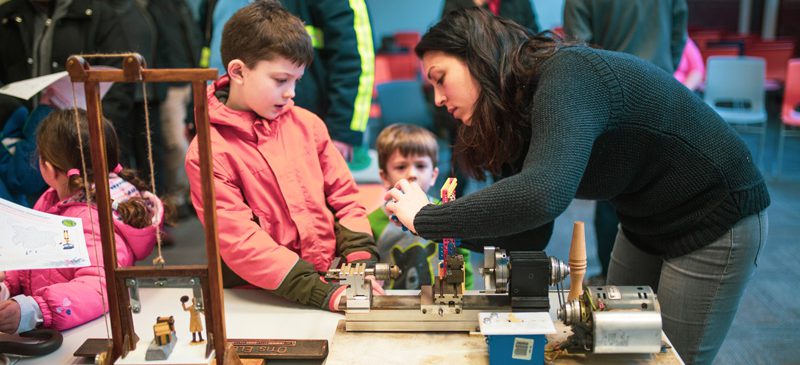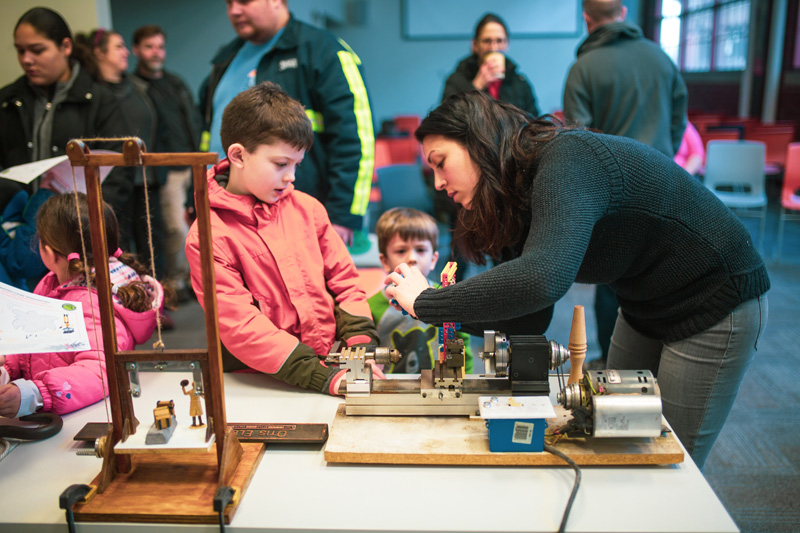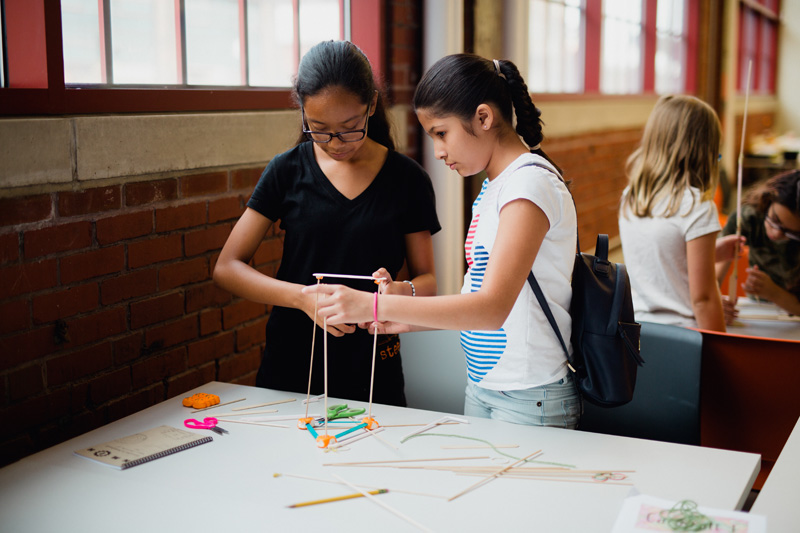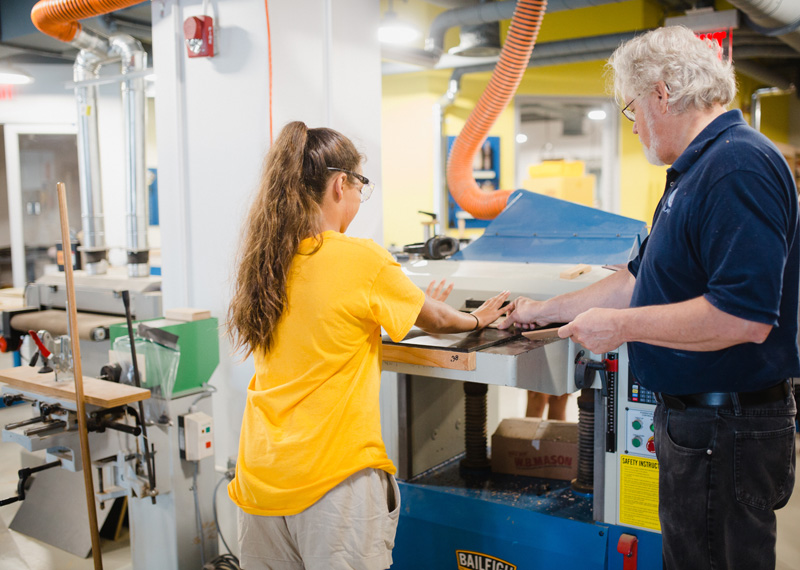
Educational Programs

“I just wanted to reiterate what an
excellent experience my students and I had at
NMIH today. Your rapport with the students,
knowledge of the exhibits and history, and the quality
of the exhibits and museum setup made it an
overall outstanding educational experience.”-Nancy Dean, 5th grade teacher at Good Shepherd Christian Academy
Looking for unique field trip destinations and outreach programs for your students?
Come check out the National Museum of Industrial History in Bethlehem, PA!
The mission of the National Museum of Industrial History, in affiliation with the Smithsonian Institution, is to forge a connection between America’s industrial past and the innovations of today by educating the public and inspiring the visionaries of tomorrow. We strive to meet our mission statement by creating exhibitions and educational programing that tell the stories of the people, machines and ideas that are part of America’s industrial heritage. Located on the Historic Bethlehem Steel site, NMIH houses artifacts from the Smithsonian’s American History Industrial Machinery collection, the Bethlehem Steel Plant, the Lehigh Valley’s Silk Mills, and Pennsylvania’s Propane Industry. Interactive exhibits encourage learners of all ages to see how much horsepower they can produce, challenges them to lift as much pig iron as a Bethlehem Steel worker, invites them to learn how to use a loom to create intricate patterns, and introduces them to all the ways propane impacts their modern lives.

The National Museum of Industrial History offers the following educational programing:
School Field Trips
School field trips are available for grades K-12. Students will participate in an informative and interactive guided tour of the Museum with experienced docents. We offer pre and post lessons that meet curriculum standards while providing educators the flexibility to adapt the content to fit their subject and student needs. For more info on booking a tour, please contact the museum at [email protected]. Your school may qualify for free or reduced costs for school field trips. Find out more here.
Hands on Learning Stations
In the Centennial Gallery, see and touch a sample piece from each of our woodworking machines, files like those from the Nicholson File Company, and discover the difference between hand-made and mass produced nails. Learn how mechanization revolutionized industries making products more affordable for the consumer.
In the Iron and Steel Gallery, visitors have the opportunity to handle the local natural resources that are the foundation of Pennsylvania’s industrial heritage. Follow these raw materials as they were historically combined to make wrought and cast iron products and then discover how the local iron industry became the nationally recognized Bethlehem Steel Corporation.
In the Silk Gallery, we invite visitors to see the life cycle of the silk worm, touch silk worm cocoons, and feel silk in various stages of its production. Play a matching game between natural dyes, their plant source, and colorful silk threads. Learn about the invention of the power loom and try your hand at weaving a pattern.
In the Propane Gallery, discover how propane is distilled, stored, and shipped while helping perform an experiment illustration Walter Snelling’s original experiment which identified propane as the volatile gas in liquid gasoline.

Add-on Experiences
Enhance your students’ visit to the National Museum of Industrial History with one of our add-on options. These educational programs offer your students the opportunity extend their experience in the galleries by engaging with the content in a deeper way and practice skills such as observation, evaluation, problem solving, and making connections.
Casting
Grades: 8-12
Group Limit: 15
Duration: 60 minutes
Cost: $150
This one-hour program focuses on the history and process of metal casting. The future of highly engineered castings and available careers in the field are discussed. With ancient roots, metal casting has become a highly modernized industry and the backbone of the manufacturing economy (AFS). Metal casting is a $33 billion-dollar industry providing 200,000 U.S. jobs and is central to a growing economy, modern infrastructure, and national defense (AFS). The process of metal casting involves molten metal being poured into a mold made of sand, metal, or ceramic to form intricate parts such as gears. All major metals can be cast. Where are cast metals used? Castings make up 90% of all durable goods; and can be found in cars, trucks, aerospace, trains, mining and construction equipment, oil wells, appliances, pipes, hydrants, wind turbines, nuclear plants, medical devices, defense products, toys, and more (AFS). During this program we will be casting using tin because of its lower melting point. The principles discussed, taught, and experienced will all mimic the heavy industrial process of casting iron and steel.
What is a Factory?
Grades: K-4
Group Limit: 20
Duration: 45 minutes
Cost: $60
Students can connect with a different place and time through a discussion of what a factory is and what working conditions were like during the late 19th century. We consider what a factory might have sounded like as we create a soundscape and we recreate the setting as we play tableau.
Time Management
Grades: 2-8
Group Limit: 20
Duration: 45 minutes
Cost: $75
The study of time management impacts industry as well as our daily lives. How can we be more efficient and productive? Using several fun games, students are challenged to find the easiest way to be the most productive.
Centennial Sampler Grades: 5-12
Group Limit: 20
Duration: 1-2 hours
Cost: $50-$100
Step back in time to1876 and attend America’s Centennial Exposition held in Philadelphia, Pennsylvania. Play popular children’s games, sample some treats for sale at the Centennial, and take an in depth look at a few of the inventions and novelties exhibited. ($50)
Extend your experience by trying your hand at typical professions: coal miner, printer, silk mill laborer, or foundry worker. Costumes and real artifacts encourage students to adopt a persona and focus on work which foreign compared to the modern conveniences of today. ($100)
Were there women exhibitors at the Centennial Exposition? Yes! Often overlooked are the female inventors, engineers, mechanics, printers, and medical students who exhibited in the Women’s Pavilion. Introduce your students to these incredibly talented and hardworking women. ($100)
Industrial Revolution Workshop
Grades 6-12
Group Limit: 20
Duration: 45 minutes
Cost: $100
Get into character and learn how the industrial Revolution in America impacted society. We discuss how lives were improved through advancements in agriculture and medicine, how family life changed, and what working conditions were like for typical professions.
Grab-bag inventing
Grades: K-12
Group Limit: 20
Duration: 1 hour
Cost: $100
Grab Bag Inventing is an activity that allows participants to invent clever solutions while testing their creative abilities. Participants work together in small groups to design inventions with everyday items and common materials.
Engineering Challenges
Grades: 2-12
Group Limit: 20
Duration: 1-2 hours
Cost: $75- $150
Challenge your students to take part in a friendly engineering competition! Work in teams to design and build the longest marble run, the perfect catapult, or a true structural masterpiece. ($150)
- • Marble run team challenge
- • Angry Peeps: Catapult Challenge
- • Bridges and skyscrapers
Or, perhaps, give your students an opportunity to express their whimsical engineering abilities. Working independently, students will be introduced to patent drawings via Rube Goldberg before designing their own outlandish invention. Paper engineering is an option for students who enjoy a detail oriented challenge. ($75)
- • Patent Drawings and Machines Inspired by Rube Goldberg
- • Paper engineering